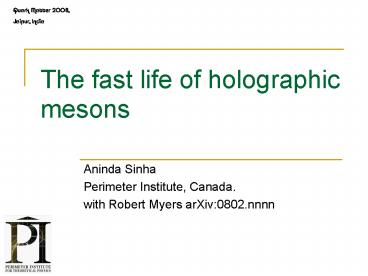The fast life of holographic mesons - PowerPoint PPT Presentation
1 / 22
Title:
The fast life of holographic mesons
Description:
Behaviour of strongly coupled QCD is of interest to RHIC and. early universe cosmology. Unfortunately, theoretical tools are rather limited. ... – PowerPoint PPT presentation
Number of Views:31
Avg rating:3.0/5.0
Title: The fast life of holographic mesons
1
The fast life of holographic mesons
Quark Matter 2008, Jaipur, India
- Aninda Sinha
- Perimeter Institute, Canada.
- with Robert Myers arXiv0802.nnnn
2
PLAN
- I) Motivation and setup
- II) Spectral functions of holographic mesons,
- decay widths
- III) Conclusion
3
I) Motivation and setup
Behaviour of strongly coupled QCD is of interest
to RHIC and early universe cosmology. Unfortunat
ely, theoretical tools are rather
limited. Recently, string theory tools involving
gauge/gravity duality have been used to gain
some insight into the nature of this interesting
regime.
limitation large NC and large t Hooft coupling
4
AdS/CFT relates N4 , d4 supersymmetric Yang
Mills theory and its deformations to a theory of
gravity in Anti-de-Sitter space (a space with
negative cosmological constant) arising as a
solution to d10 superstring theory. In
particular, the effective gravity theory is on
AdS5 x S5. The strongly coupled regime of the
gauge theory is mapped into a weakly coupled
gravity theory. Idea is to try and do
calculations using the gravity theory to
gain some insight into the strong coupling region
of the gauge theory.
5
QCD
N4 SYM
confinement, discrete spectrum, scattering, . . .
.
conformal, continuous spectrum, no S-matrix,
SUSY, . . . .
T0
very different !!
strongly-coupled plasma of gluons adjoint
matter deconfined, screening, finite corr.
lengths, . . .
strongly-coupled plasma of gluons fundamental
matter deconfined, screening, finite corr.
lengths, . . .
TgtTC
quite similar !! cf
runs to weak coupling
remains strongly-coupled
TgtgtTC
very different !!
6
RECIPE FOR HOLOGRAPHIC QUARK GLUON SOUP Aharony,
Fayazuddin, Maldacena Karch, Katz Kruczenski,
Mateos, Myers, Winters
1) Start with black hole in AdS to get finite
temperature, have deconfined adjoint matter
II) Add D-brane to get flavour
Free quark
III) String falls into black hole and melts mesons
Baryon density n causes brane to reach horizon
q
IV) Mass of meson, decay controlled by baryon
density and geometry of D-brane (quark bare mass
and condensate depend on these)
7
SPECIFIC QUESTION What can we say about the
masses and lifetimes of holographic mesons at
strong coupling? What is the nature of the
spectral functions with changing momentum and
other parameters? BROADER QUESTION (for the
future) Do these features have anything in
common with Lattice data and/or real world?
8
Spectral functions from AdS/CFT
F,G,R are functions of r which is the holographic
direction. Spectral function is defined as
For us
is large.
Can recast in terms of an effective Schrodinger
equation
9
Behaviour of effective holographic potential with
changing momentum
Bound state
Holographic direction
Horizon
10
Behaviour of effective holographic potential with
changing momentum
11
Behaviour of effective holographic potential with
changing momentum
12
Behaviour of effective holographic potential with
changing momentum
13
Behaviour of effective holographic potential with
changing momentum
14
Behaviour of effective holographic potential with
changing momentum
15
Behaviour of effective holographic potential with
changing momentum
16
Behaviour of effective holographic potential with
changing momentum
17
II) Spectral functions and widths
- n
0 0.06 0.15 0.25
q
Quasiparticles
18
nq 0.25
19
Speed limit from spectral peaks Liu, Rajagopal,
Wiedemann Mateos, Myers, Thomson Ejaz,
Faulkner, Liu, Rajagopal, Wiedemann Athanasiou,
Liiu, Rajagopal Myers, AS
nq 0.25
Real part of quasinormal frequency
20
Dispersion relations for first 3 peaks for
different parameters
vmax 0.9954
vmax 0.6512
vmax 0.3427
At same temperature, higher vmax means higher
bare quark mass. Equivalently, keeping bare quark
mass fixed, higher vmax means lower temperature.
21
Widths as function of momenta Myers, AS
V0.34
V0.65
V0.99
Location where effective potential has no minima
22
Conclusion
- Holographic methods suggest finite velocity
effects in the dispersion relations. Arise quite
generally due to red-shift in the dual gravity
picture. - Finite baryon density induces quasiparticle
widths to grow dramatically with momenta. Can be
quite general but needs further investigation.
THANKS FOR LISTENING
23
(No Transcript)
24
(No Transcript)
25
Mesons
Kruczenski, Mateos, RCM and Winters (hep-th/030403
2)
lowest lying open string states are excitations
of the massless modes on D7-brane vector,
scalars ( spinors)
their dynamics is governed by usual worldvolume
action
- free spectrum
- expand action to second order in fluctuations
- solve linearized eqs of motion by separation of
variables
Veff
discrete spectrum
Mesons stable
r
26
Reminder about large N counting
entropy density
counts of d.o.f.
entropy density
counts of d.o.f.
in our limit, thermodynamics dominated by adjoint
fields we are calculating small corrections due
to fundamental matter
these dominate over quantum effects, eg, Hawking
radiation,
27
Brane entropy
Transition temperature
1st order phase transition
28
Kobayashi, Mateos, Matsuura, RCM Thomson
hep-th/0611099
Mateos, Matsuura, RCM Thomson
arXiv0709.1225 . . . . .
Need an extra dial Quark density
D7-brane gauge field
asymptotically (??8)
electric field lines cant end in empty space
nq produces neck
BH embedding with tunable horizon































